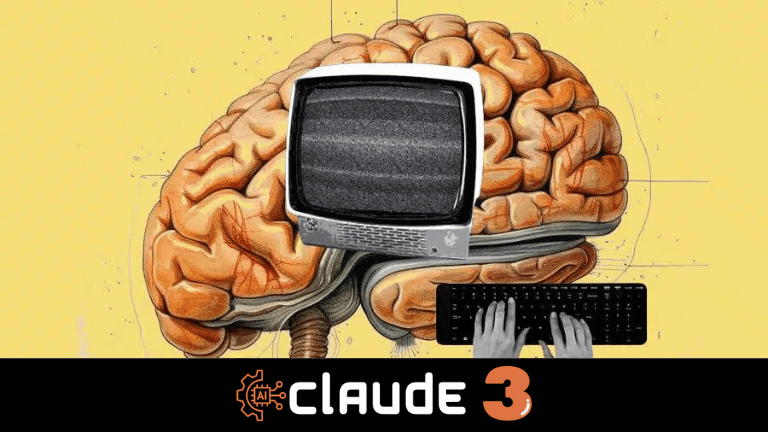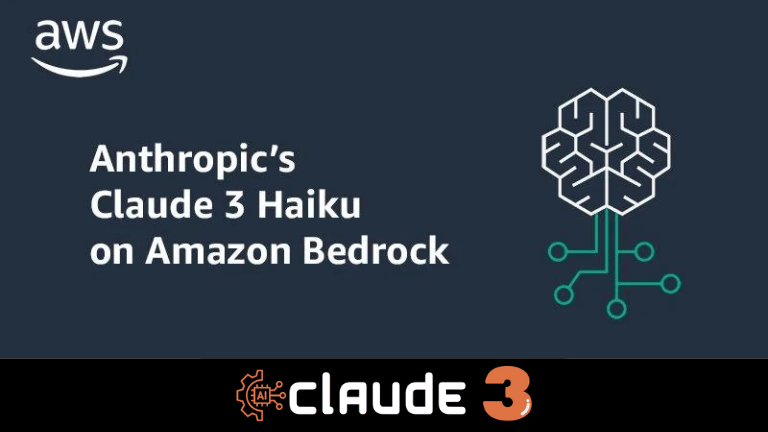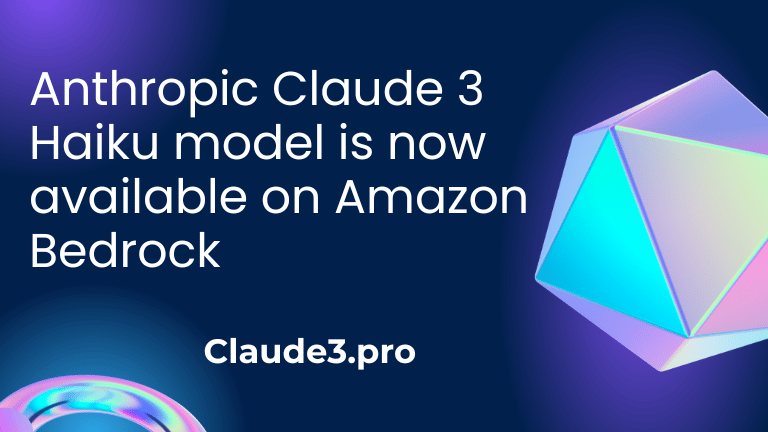Anthropic Claude 3 Haiku model is now available on Amazon Bedrock. This groundbreaking collaboration between Anthropic, a leading AI research company, and Amazon Web Services (AWS) promises to revolutionize the way we interact with and leverage AI technology. In this comprehensive guide, we’ll explore the Anthropic Claude 3 Haiku model, its capabilities, and the potential impact it can have across various industries.
Understanding Anthropic and Claude
Before delving into the details of the Claude 3 Haiku model, it’s essential to understand the background of Anthropic and its flagship AI model, Claude.
Anthropic: A Pioneer in AI Research
Anthropic is a San Francisco-based AI research company that has garnered significant attention for its groundbreaking work in developing advanced AI systems. Founded by researchers from OpenAI, Google, and Stanford, Anthropic is dedicated to pushing the boundaries of AI capabilities while ensuring that these powerful technologies are developed and deployed in a responsible and ethical manner.
Claude: A Versatile and Capable AI Model
Claude is Anthropic’s flagship AI model, renowned for its versatility, capability, and ethical foundations. Trained on a vast corpus of data, Claude excels in a wide range of tasks, including natural language processing, question answering, analysis, writing, coding, and problem-solving.
What sets Claude apart is its strong emphasis on ethical behavior and safety considerations. Anthropic has implemented robust safeguards and principles to ensure that Claude operates within ethical boundaries, respecting privacy, avoiding harmful outputs, and promoting truthful and beneficial interactions.
The Anthropic Claude 3 Haiku Model
The Anthropic Claude 3 Haiku model is the latest iteration of Claude, optimized for deployment on Amazon Bedrock, AWS’s innovative cloud-based service for running machine learning models at scale. This collaboration between Anthropic and AWS promises to bring the power of Claude to a wider audience, enabling businesses, developers, and researchers to leverage its capabilities with ease and efficiency.
Key Features and Capabilities
The Anthropic Claude 3 Haiku model inherits the strengths of its predecessor while introducing several enhancements and optimizations:
- Improved Natural Language Processing: The model boasts advanced natural language processing capabilities, enabling more accurate understanding and generation of human-like text across a wide range of domains and contexts.
- Enhanced Reasoning and Analysis: With its strong reasoning and analytical capabilities, the Claude 3 Haiku model can tackle complex problems, draw insights from data, and provide well-reasoned recommendations and solutions.
- Expanded Knowledge Base: Anthropic has expanded the model’s knowledge base, allowing it to draw from a broader range of information and stay up-to-date with the latest developments across various fields.
- Ethical and Safe Interactions: Building upon Claude’s strong ethical foundations, the Claude 3 Haiku model maintains robust safeguards to ensure responsible and safe interactions, avoiding harmful outputs and respecting privacy and ethical boundaries.
- Scalability and Performance: Optimized for Amazon Bedrock, the model can be deployed and scaled efficiently, ensuring high performance and low latency, even under demanding workloads.
Applications and Use Cases
The versatility of the Anthropic Claude 3 Haiku model opens up a wide range of potential applications and use cases across various industries:
- Natural Language Processing and Generation: The model’s advanced language capabilities make it well-suited for tasks such as content creation, language translation, sentiment analysis, and conversational AI systems.
- Research and Analysis: Researchers and analysts can leverage the model’s reasoning and analytical capabilities to uncover insights, identify patterns, and make data-driven decisions.
- Customer Service and Support: The model can be integrated into customer service chatbots and virtual assistants, providing accurate and personalized responses to customer inquiries and requests.
- Healthcare and Biomedical Research: The Claude 3 Haiku model can assist in biomedical research, drug discovery, and medical diagnosis by analyzing large datasets and identifying relevant insights.
- Education and Tutoring: The model’s ability to understand and generate human-like text can be used to create personalized learning experiences, interactive tutoring systems, and educational content.
- Creative Industries: Writers, artists, and content creators can leverage the model’s language generation capabilities to overcome writer’s block, generate ideas, or explore new creative directions.
- Business Intelligence and Analytics: Businesses can utilize the model’s analytical capabilities to gain insights into market trends, customer behavior, and operational data, informing strategic decision-making processes.
These are just a few examples of the potential applications of the Anthropic Claude 3 Haiku model. As AI technology continues to evolve, new and innovative use cases are expected to emerge, further highlighting the versatility and potential impact of this powerful AI system.
Deploying the Anthropic Claude 3 Haiku Model on Amazon Bedrock
While the Anthropic Claude 3 Haiku model offers incredible capabilities, harnessing its full potential requires a robust and scalable infrastructure. This is where Amazon Bedrock comes into play, providing a seamless and efficient platform for deploying and managing machine learning models at scale.
What is Amazon Bedrock?
Amazon Bedrock is a fully managed service offered by AWS, designed specifically for running machine learning models in production environments. It abstracts away the complexities of infrastructure management, allowing developers and businesses to focus on building and deploying their models without worrying about scalability, performance, or operational challenges.
Benefits of Using Amazon Bedrock
By deploying the Anthropic Claude 3 Haiku model on Amazon Bedrock, businesses and developers can enjoy the following benefits:
- Scalability and Performance: Amazon Bedrock is built to handle demanding workloads, ensuring that the Claude 3 Haiku model can scale up or down seamlessly to meet changing demands, while maintaining high performance and low latency.
- Cost Efficiency: With Bedrock’s pay-as-you-go pricing model, businesses only pay for the resources they consume, optimizing their costs and avoiding over-provisioning or under-utilization.
- Simplified Model Management: Bedrock streamlines the process of deploying, updating, and managing machine learning models, reducing the operational overhead and allowing teams to focus on model development and optimization.
- Seamless Integration: Being a part of the AWS ecosystem, Amazon Bedrock integrates seamlessly with other AWS services, enabling seamless data ingestion, processing, and analysis pipelines.
- Security and Compliance: AWS adheres to strict security and compliance standards, ensuring that the Anthropic Claude 3 Haiku model and its associated data are protected and compliant with industry regulations.
Getting Started with Amazon Bedrock
To get started with deploying the Anthropic Claude 3 Haiku model on Amazon Bedrock, follow these general steps:
- Set up an AWS Account: If you don’t already have one, create an AWS account and configure the necessary permissions and access credentials.
- Obtain the Model Artifacts: Acquire the Anthropic Claude 3 Haiku model artifacts from Anthropic or the AWS Marketplace, ensuring compliance with any licensing or usage terms.
- Create a Bedrock Model Package: Package the model artifacts into a Bedrock-compatible format, including any necessary dependencies or configurations.
- Deploy the Model on Bedrock: Use the AWS Management Console, AWS Command Line Interface (CLI), or AWS SDKs to deploy the model package on Amazon Bedrock, specifying the desired instance types, scaling configurations, and any additional settings.
- Integrate and Test: Once deployed, integrate the Anthropic Claude 3 Haiku model into your applications or workflows, and thoroughly test its functionality and performance to ensure it meets your requirements.
- Monitor and Optimize: Continuously monitor the model’s performance, resource utilization, and costs, and make adjustments as needed to optimize its deployment and ensure efficient operation.
Anthropic and AWS provide detailed documentation, guides, and support resources to assist you throughout the deployment process, ensuring a smooth and successful integration of the Anthropic Claude 3 Haiku model into your workflow.

Ethical Considerations and Responsible AI
As with any powerful AI technology, the deployment and utilization of the Anthropic Claude 3 Haiku model must be approached with careful consideration of ethical implications and responsible AI practices. Anthropic and AWS have taken steps to address these concerns, but it is also incumbent upon users and businesses to uphold ethical standards and mitigate potential risks.
Anthropic’s Ethical AI Principles
Anthropic has been a leader in promoting the responsible development and deployment of AI systems. The company has established a set of ethical AI principles that guide its work, including:
- Beneficial AI: Anthropic is committed to developing AI systems that benefit humanity and contribute to the greater good, avoiding the creation of technologies that could cause harm or be misused for nefarious purposes.
- Robust and Safe Systems: The company prioritizes the development of robust and safe AI systems, implementing rigorous safeguards and testing procedures to ensure their reliability and minimize the potential for unintended consequences or negative impacts.
- Transparency and Accountability: Anthropic values transparency and accountability in its AI development processes, engaging with stakeholders, and being open about its methods, decisions, and potential implications.
- Respect for Human Values and Rights: The company’s AI systems are designed to respect human values, rights, and cultural diversity, avoiding discrimination, bias, or infringement on individual privacy and autonomy.
- Ethical Oversight and Governance: Anthropic has established strong ethical oversight and governance processes, involving diverse perspectives and expertise to ensure that its AI technologies are developed and deployed responsibly.
These principles serve as a foundation for the development and deployment of the Anthropic Claude 3 Haiku model, instilling confidence in its ethical underpinnings and commitment to responsible AI practices.
AWS’s AI and Machine Learning Guidelines
AWS, as a leading cloud computing provider, has also established guidelines and best practices for the responsible development and deployment of AI and machine learning systems on its platform. These guidelines cover areas such as:
- Data Privacy and Security: AWS emphasizes the importance of protecting user data privacy and ensuring the secure handling and storage of sensitive information throughout the AI development and deployment lifecycle.
- Fairness and Bias Mitigation: AWS provides guidance on identifying and mitigating potential biases in AI systems, promoting fairness and equal treatment across diverse populations and use cases.
- Transparency and Explainability: AWS encourages transparency and explainability in AI systems, enabling users to understand the decision-making processes and rationale behind model outputs.
- Robustness and Reliability: AWS offers tools and best practices to ensure the robustness and reliability of AI systems, minimizing the risk of unintended behaviors or failures in production environments.
- Ethical Use and Governance: AWS provides resources and guidance on the ethical use of AI technologies, encouraging users to establish governance frameworks and oversight processes to ensure responsible deployment and monitoring.
By adhering to these guidelines, businesses and developers can ensure that their use of the Anthropic Claude 3 Haiku model on Amazon Bedrock aligns with ethical principles and responsible AI practices.
User Responsibilities and Best Practices
While Anthropic and AWS have established strong foundations for ethical and responsible AI, it is ultimately up to the users and businesses deploying the Anthropic Claude 3 Haiku model to uphold these principles and mitigate potential risks. Here are some best practices to consider:
- Conduct Thorough Testing and Validation: Before deploying the Anthropic Claude 3 Haiku model in production environments, conduct extensive testing and validation to ensure its accuracy, reliability, and adherence to ethical standards. This includes testing for potential biases, unintended outputs, and edge cases.
- Establish Clear Use Policies and Guidelines: Develop and communicate clear policies and guidelines for the appropriate use of the Anthropic Claude 3 Haiku model within your organization, defining acceptable use cases, data handling procedures, and ethical boundaries.
- Implement Monitoring and Oversight: Establish robust monitoring and oversight processes to continuously evaluate the model’s performance, outputs, and potential impacts. Identify and address any ethical concerns or issues promptly.
- Provide Transparency and Explainability: Strive for transparency by providing clear explanations and documentation about the model’s capabilities, limitations, and decision-making processes. This empowers users to make informed decisions and fosters trust in the technology.
- Prioritize Privacy and Data Protection: Implement strict data privacy and protection measures, ensuring that any personal or sensitive information used in training or interacting with the model is handled securely and in compliance with relevant regulations.
- Foster Ethical Literacy and Training: Invest in ethical literacy and training programs for employees and stakeholders involved in the deployment and use of the Anthropic Claude 3 Haiku model, promoting a culture of responsible AI practices within your organization.
- Engage with Stakeholders and Experts: Collaborate with relevant stakeholders, subject matter experts, and ethical advisory boards to gain diverse perspectives and insights on the responsible deployment and use of the Anthropic Claude 3 Haiku model.
By embracing these best practices and fostering a culture of ethical and responsible AI, businesses and developers can harness the full potential of the Anthropic Claude 3 Haiku model while mitigating potential risks and upholding the highest ethical standards.
Conclusion
The availability of the Anthropic Claude 3 Haiku model on Amazon Bedrock marks a significant milestone in the evolution of AI technology. This powerful collaboration between Anthropic and AWS promises to unlock new possibilities and drive innovation across various industries, enabling businesses and developers to leverage the model’s advanced capabilities with ease and efficiency.
As we embrace this technological advancement, it is crucial to remain vigilant and proactive in upholding ethical principles and responsible AI practices. By prioritizing transparency, accountability, and a commitment to beneficial outcomes, we can harness the transformative power of AI while mitigating potential risks and ensuring its responsible deployment.
The Anthropic Claude 3 Haiku model represents a step forward in the journey towards more capable, ethical, and trustworthy AI systems. As we continue to push the boundaries of what is possible, it is our collective responsibility to ensure that these advancements are guided by a strong ethical compass, promoting the greater good and safeguarding the well-being of humanity.

FAQs
What is the Anthropic Claude 3 Haiku model?
The Anthropic Claude 3 Haiku model is an advanced AI model developed by Anthropic for generating haiku poetry.
How does the Anthropic Claude 3 Haiku model differ from other Claude 3 models?
The Anthropic Claude 3 Haiku model is specialized in generating haiku poetry, whereas other Claude 3 models may have different focuses or capabilities.
What are the key features of the Anthropic Claude 3 Haiku model?
The key features of the Anthropic Claude 3 Haiku model include its ability to generate traditional Japanese haiku poetry with a focus on nature and seasonality.
How can I purchase the Anthropic Claude 3 Haiku model on Amazon Bedrock?
You can purchase the Anthropic Claude 3 Haiku model on Amazon Bedrock by searching for it in the Amazon search bar and completing the purchase process.
Is the Anthropic Claude 3 Haiku model compatible with other Claude 3 products?
Yes, the Anthropic Claude 3 Haiku model is compatible with other Claude 3 products and can be integrated into existing Claude 3 workflows.
What are some use cases for the Anthropic Claude 3 Haiku model?
Some use cases for the Anthropic Claude 3 Haiku model include generating haiku poetry for artistic purposes, educational use, or as part of AI-generated content.
How is the performance of the Anthropic Claude 3 Haiku model compared to other AI models?
The performance of the Anthropic Claude 3 Haiku model is highly regarded for its ability to generate high-quality haiku poetry that adheres to traditional Japanese principles.
Can I use the Anthropic Claude 3 Haiku model for commercial purposes?
Yes, you can use the Anthropic Claude 3 Haiku model for commercial purposes, such as generating content for publications, websites, or marketing materials.
Are there any tutorials or guides available for using the Anthropic Claude 3 Haiku model?
Yes, Anthropic provides tutorials and guides for using the Claude 3 Haiku model, which can be found on their website or through Amazon Bedrock.
What kind of support is available for users of the Anthropic Claude 3 Haiku model on Amazon Bedrock?
Users of the Anthropic Claude 3 Haiku model can access support through Amazon Bedrock’s customer service for any issues or questions they may have.
